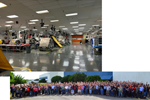ST Engineering MRAS presents initiatives to drive autoclave efficiency, automation
During a JEC World 2024 panel discussion, the company revealed ways in which it is maximizing throughput and efficiency of its autoclaves and enhancing composites production processes.
Source | ST Engineering MRAS
During JEC World 2024, ST Engineering MRAS (Baltimore, Md., U.S.) announced a series of new initiatives aimed at enhancing autoclave efficiency and advancing automation in composites manufacturing. Mitch Smith, director of technology and process engineering, and acting vice president of operations at MRAS, highlighted these developments during a panel discussion on “Composites 4.0: Unlocking Efficiency and Sustainability Through Automation and Digitalization.”
During this panel, MRAS revealed its novel dynamic scheduling system designed to maximize throughput and efficiency for the autoclaves it operates, which number nearly a dozen. This system continually monitors material journeys and coordinates batch curing with machine run schedules to optimize autoclave capacity. MRAS’ approach to autoclaves aims to improve its own energy efficiency by using processing time more effectively, reducing energy consumption and improving sustainability.
“Our team is dedicated to finding the most effective ways to use our autoclaves,” says Smith. “By optimizing load scheduling and ensuring parts are autoclave-ready, we can significantly increase efficiency and reduce waste.”
In addition to autoclave optimization, MRAS is investing in advanced IT systems, cybersecurity and robotic hardware to enhance production processes. These technologies are part of the company’s broader strategy to create a “Factory of the Future” that balances current technological capabilities with forward-looking innovations.
“Implementing digital systems helps us be more competitive on future programs and optimize our current product stream,” Smith explains. “Automation can enhance job quality and create opportunities for higher technical learning among staff. Robotics enable our staff to engage in more advanced technical tasks, which not only contributes to their professional growth but also to the overall advancement of our business.”
To ensure that both human expertise and digital systems can work together harmoniously, MRAS has embarked on getting buy-in from experienced staff and involving them early in the transition to automated processes. “Automation systems provide valuable insights, but they require validation by experienced staff to ensure accurate and effective implementation,” Smith adds. “It’s about combining human judgment with data-driven suggestions to achieve the best outcomes.”
Related Content
-
Broetje-Automation demonstrates rCF placement via AFP
Through the ScrapSeRO project, the system integrator and machine builder successfully processed recycled composites, in addition to more traditional materials, via its highly flexible Staxx One system.
-
TAVieDA project team cuts aircraft door production time using thermoplastic composites, welding
Fraunhofer groups, Trelleborg and Airbus develop modular, fully automated assembly system concept to replace metals and time-consuming assembly that shows potential for scalability.
-
How AI is improving composites operations and factory sustainability
Workforce pain points and various logistical challenges are putting operations resilience and flexibility to the test, but Industry 4.0 advancements could be the key to composites manufacturers’ transformation.






